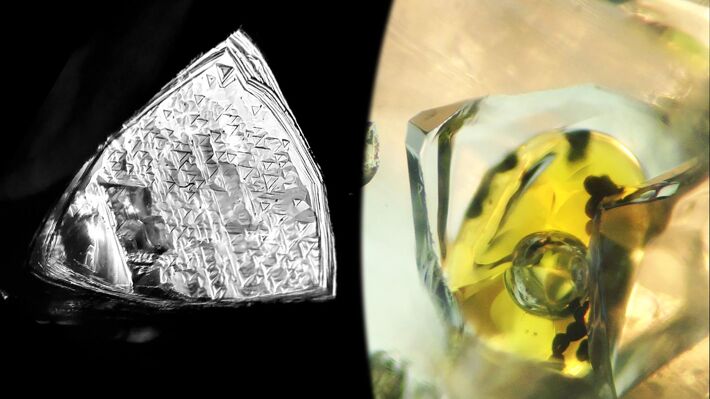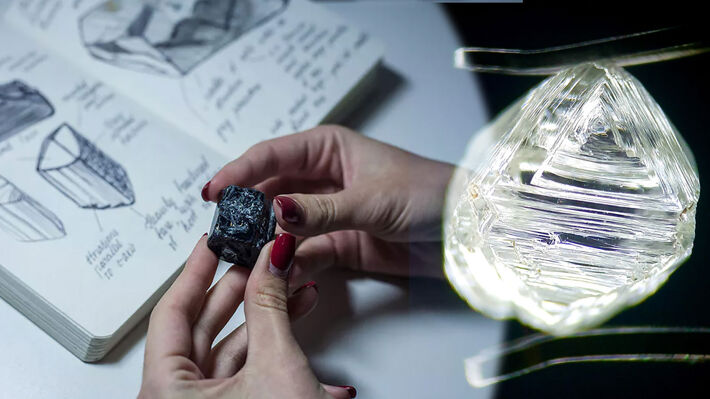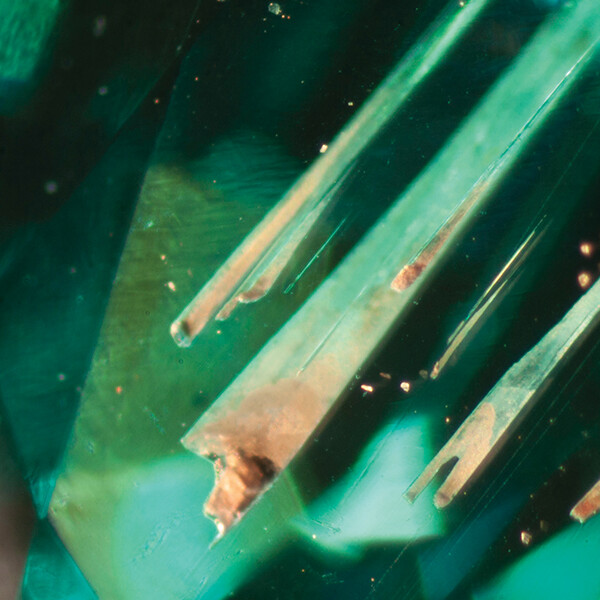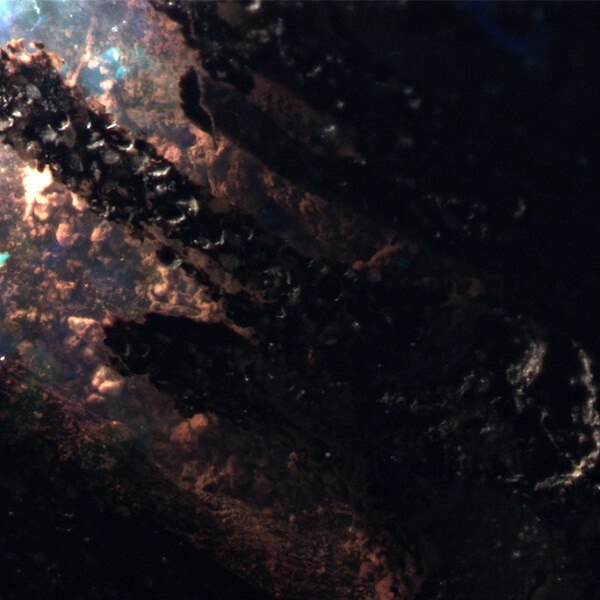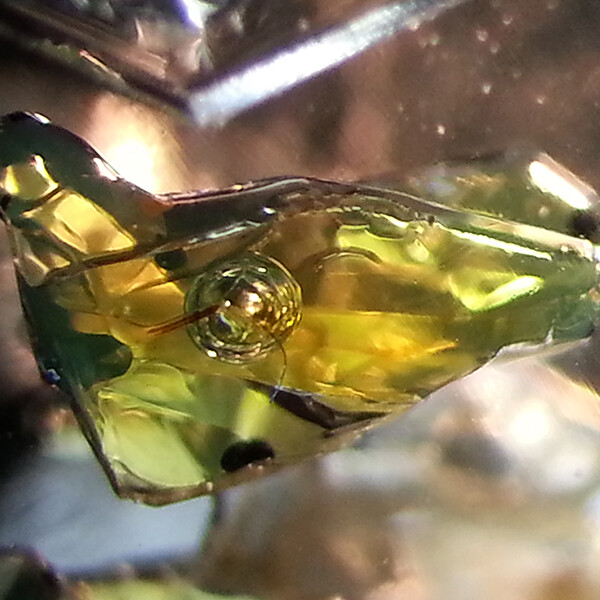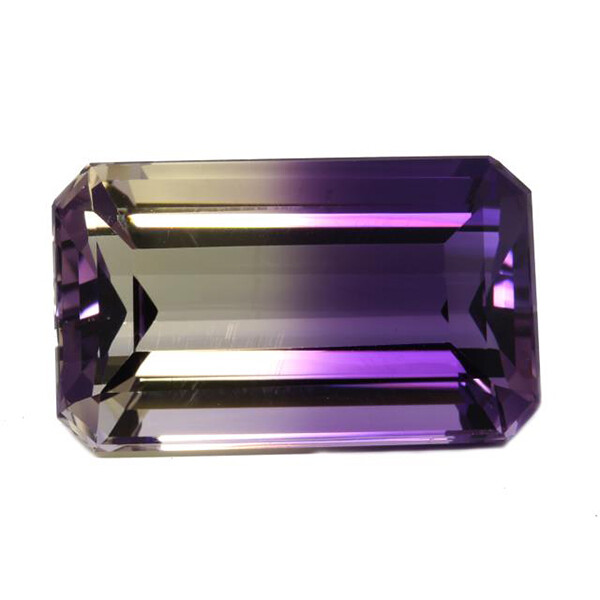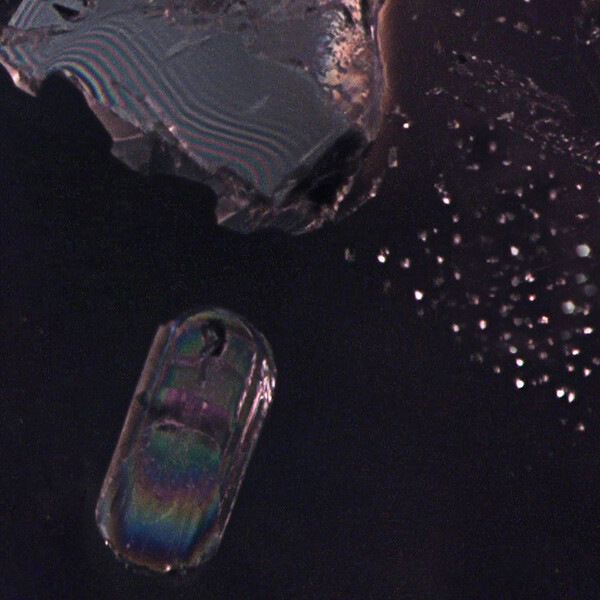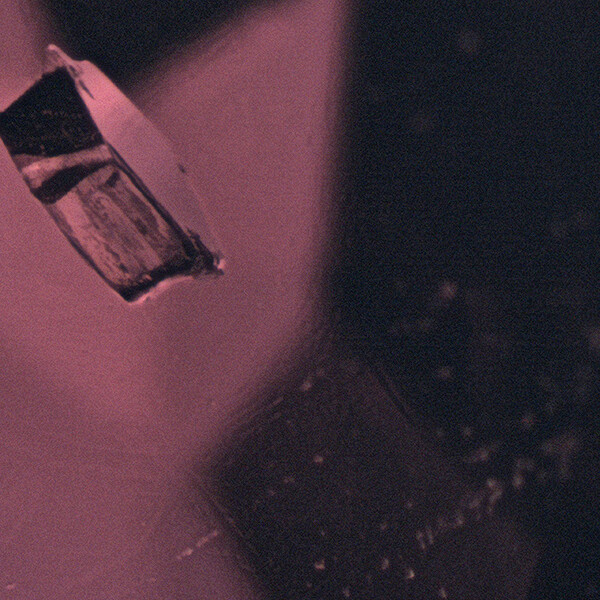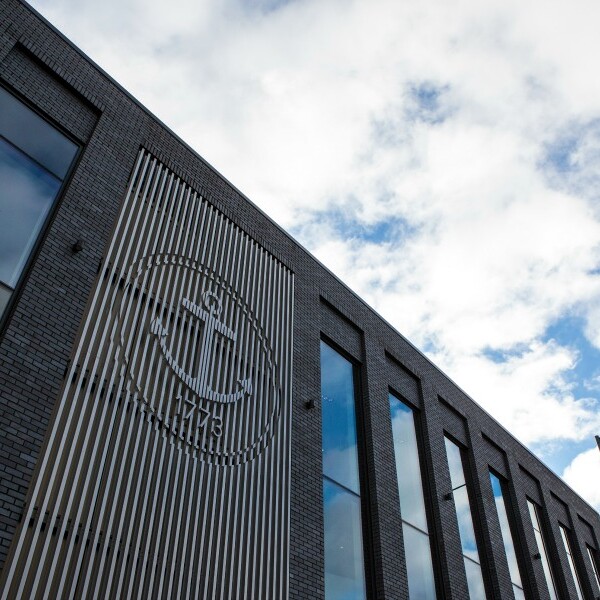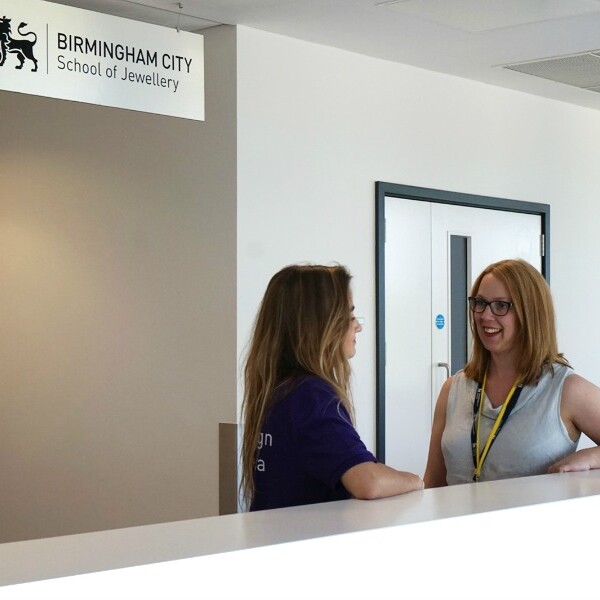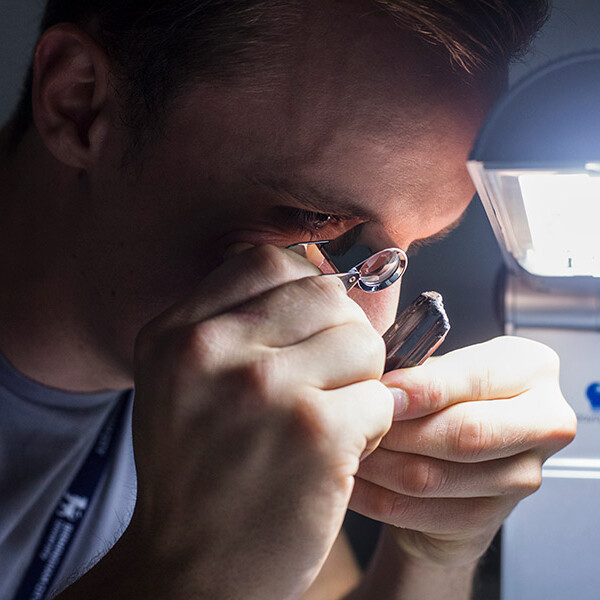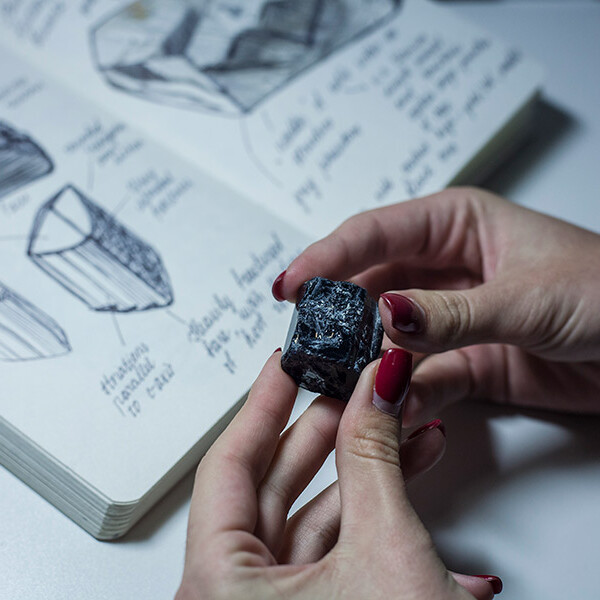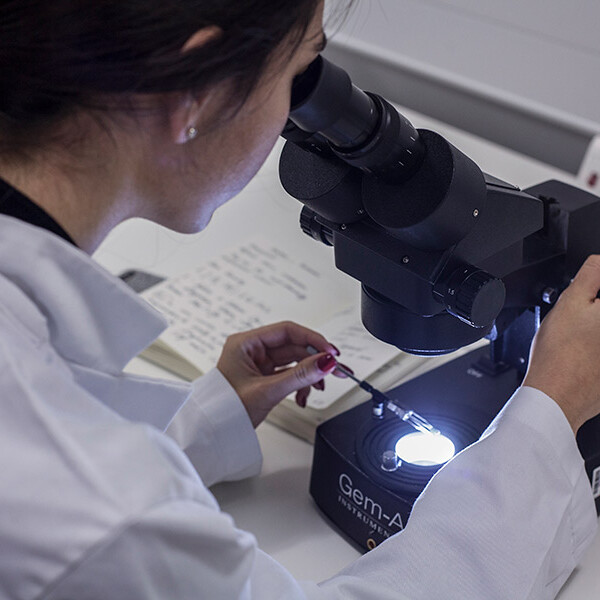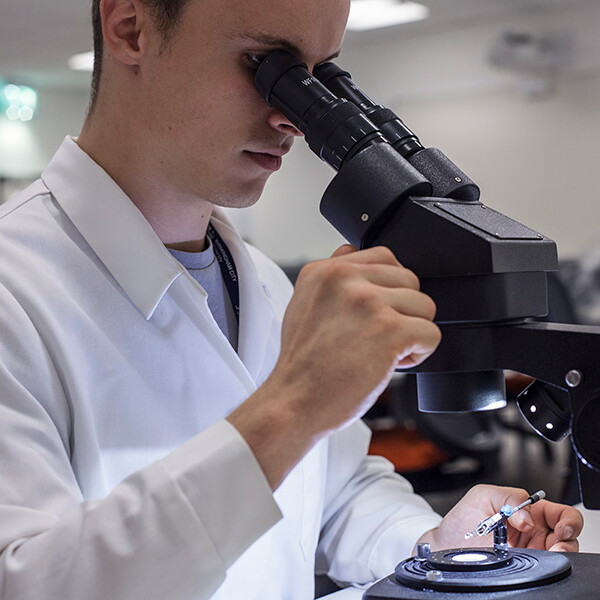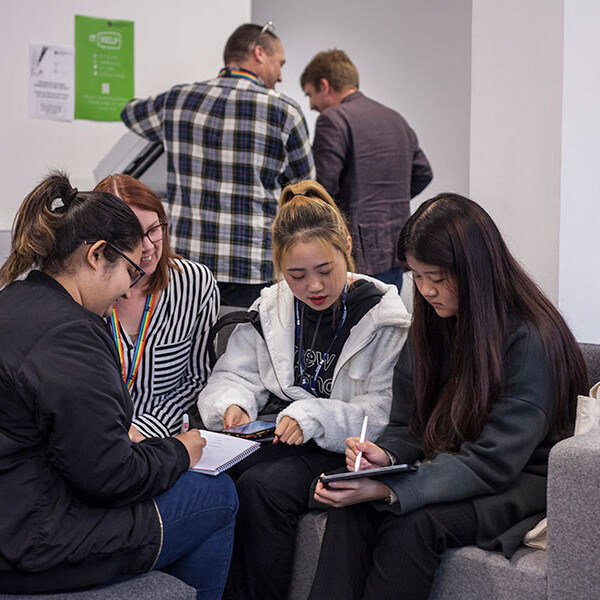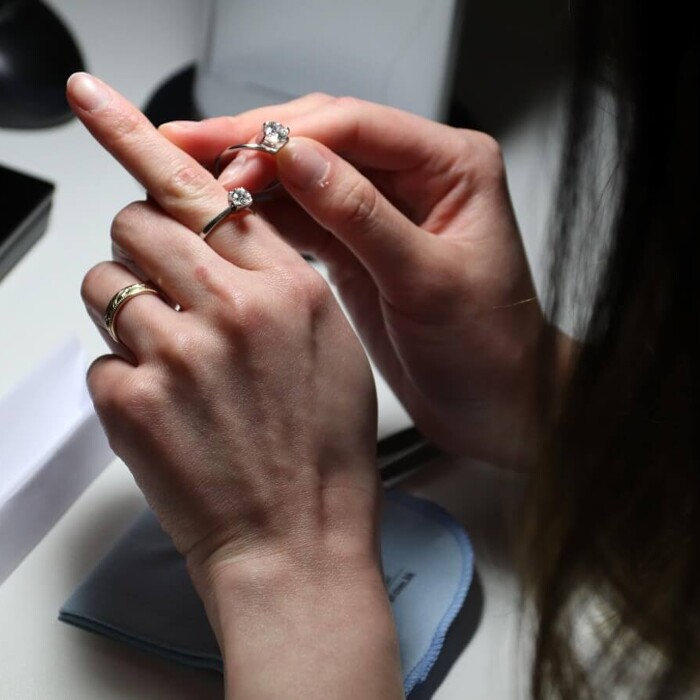Gemmology and Jewellery Studies - BSc (Hons)
Currently viewing course to start in 2025/26 Entry.
Our unique BSc Gemmology and Jewellery Studies course is globally renowned, and is deeply rooted in the rich history of Birmingham's Jewellery Quarter, which has been a hub of the gemstone industry since the 1800s....
- Level Undergraduate
- Study mode Full Time
- Award BSc (Hons)
- Start date September 2025
- Fees View course fees
- Subject
- Location School of Jewellery
This course is:
Available with Professional Placement year
Open to International Students
Overview
Our unique BSc Gemmology and Jewellery Studies course is globally renowned, and is deeply rooted in the rich history of Birmingham's Jewellery Quarter, which has been a hub of the gemstone industry since the 1800s.
This cutting-edge course goes beyond the levels of gemstone identification and grading that are found in the professional qualifications that are our only competitors, and explore advanced topics such as mineralogy, lab techniques, jewellery valuation, and the critical issues of ethics and sustainability in the industry.
Our diverse cohort of students benefit from hands-on training in state-of-the-art laboratory facilities, gaining practical expertise guided by industry-leading staff.
What's covered in this course?
Many of our students have no formal science training before they come to BCU, but we equip our graduates with the technical knowledge and industry insights to excel in their chosen field.
Our excellent partnerships with industry help them succeed in an impressive variety of global roles including high-end auction houses, jewellery valuation, international laboratories, education, mining industry, and the global gem and diamond markets.
Our international reach means that we have exciting partnerships with institutions around the world, while our local influence sees us input into practical jewellery and short courses, as well as our own programmes.
Professional Placement Year
This course offers an optional professional placement year. This allows you to spend a whole year with an employer, following successful completion of your second year, and is a great way to find out more about your chosen career. Some students even return to the same employers after completing their studies.
If you choose to pursue a placement year, you will need to find a suitable placement to complement your chosen area of study. You will be able to draw on the University’s extensive network of local, regional, and national employers, and the support of our Careers teams. If you are able to secure a placement, you can request to be transferred to the placement version of the course.
Please note that fees are payable during your placement year, equivalent to 20% of the total full-time course fee for that year.
The BSc Gemmology degree is an essential course for anyone looking for a career in the gemstone or diamond industry. Whether you are a budding Lab Technician, Diamond Grader, Researcher or Jewellery Retailer, this course has something for everyone. You will learn a wide range of skills from all aspects and nuances of gemstone analysis to some of the wonderful history of jewels and jewellery.
Jonathan Solomons
Why Choose Us?
- This Gemmology and Jewellery Studies degree is one of the only courses of its kind.
- It is taught by industry experts and leading academics in their field.
- You’ll work in state-of-the-art, purpose-built facilities, with an extensive range of both standard and advanced gemmological equipment.
- You will have the opportunity to continue your study at postgraduate level with our ground breaking research team.
- Our department has extensive links with industry, and sponsors include Garrard and Fellows.
- You study where the industry practices – the course is based in Birmingham’s Jewellery Quarter, where an estimated 40 per cent of British jewellery is made today.
- Founded in 1890, our internationally-renowned School of Jewellery is the largest school of its kind in Europe.
Similar Courses
Open Days
Join us for an Open Day where you'll be able to learn about this course in detail, chat to students, explore our campus and tour accommodation. Booking isn't open for this event yet, register your interest and we'll let you know as soon as booking goes live.
Next Open Day: 28 June 2025
Entry Requirements
These entry requirements apply for entry in 2025/26.
All required qualifications/grades must have been achieved and evidenced at the earliest opportunity after accepting an offer to help confirm admission and allow for on-time enrolment. This can also include other requirements, like a fee status form and relevant documents. Applicants can track their application and outstanding information requests through their BCU mySRS account.
Essential requirements
- Standard offer: 112 UCAS Tariff points. Learn more about UCAS Tariff points.
- Accelerate offer: 80 UCAS Tariff points. Find out more about BCU Accelerate.
Applicants will also need to complete an interview for this course; see interview arrangements below.
If you have a qualification that is not listed, please contact us.
Fees & How to Apply
UK students
Annual and modular tuition fees shown are applicable to the first year of study. The University reserves the right to increase fees for subsequent years of study in line with increases in inflation (capped at 5%) or to reflect changes in Government funding policies or changes agreed by Parliament. View fees for continuing students.
Award: BSc (Hons)
Starting: Sep 2025
- Mode
- Duration
- Fees
- Full Time
- 3 years
- £9,535 in 2025/26 ✱ Important note for this price
- Apply via UCAS
(↩Back to price) * The Government is proposing to increase the cap on full-time regulated tuition fees to £9,535 for 2025/26 and the University is planning on increasing fees to that maximum level once legislation is enacted. Part-time fees are charged pro-rata, where applicable.
International students
Annual and modular tuition fees shown are applicable to the first year of study. The University reserves the right to increase fees for subsequent years of study in line with increases in inflation (capped at 5%) or to reflect changes in Government funding policies or changes agreed by Parliament. View fees for continuing students.
Award: BSc (Hons)
Starting: Sep 2025
- Mode
- Duration
- Fees
- Full Time
- 3 years
- £18,600 in 2025/26
Guidance for UK students
UK students applying for most undergraduate degree courses in the UK will need to apply through UCAS.
The Universities and Colleges Admissions Service (UCAS) is a UK organisation responsible for managing applications to university and college.
Applying through UCAS
- Register with UCAS
- Login to UCAS and complete your details
- Select your course and write a personal statement
- Get a reference
- Pay your application fee and submit your application
Guidance for International students
There are three ways to apply:
1) Direct to the University
You will need to complete our International Application Form and Equal Opportunities Form, and submit them together with scan copies of your original academic transcripts and certificates.
2) Through a country representative
Our in-country representatives can help you make your application and apply for a visa. They can also offer advice on travel, living in the UK and studying abroad.
3) Through UCAS
If you are applying for an undergraduate degree or a Higher National Diploma (HND), you can apply through the UK’s Universities and Colleges Admissions Service (UCAS).
You can request a printed form from your school or nearest British Council office. You will be charged for applying through UCAS. Birmingham City University’s UCAS code is B25 BCITY.
Personal statement
UK / EU students are required to submit a personal statement as part of their application for this course.*
The personal statement gives you a crucial opportunity to say why you’re applying and why the institution should accept you.
Here are the key areas you’ll need to address:
- Course choice - Why does this course appeal? What areas are of particular interest?
- Career plans - If you have a specific career in mind, say how your chosen course will help you pursue this goal.
- Work experience - Mention any work that is relevant to your subject, highlighting the skills and experience gained.
- School or college experience - Highlight skills gained at school/college, eg summer schools or mentoring activities.
- Non-accredited skills or achievement - eg Duke of Edinburgh Award, Young Enterprise scheme.
You should also mention your future plans – if you’re planning to take a year out, don't forget to give your reasons. Talk about any subjects you’re studying that don’t have a formal assessment and any sponsorships or placements you’ve applied for. And don't be scared to add in details about your social, sports or leisure interests.
Worried about Personal Statements?
If you've got no idea where to start or just want to check you're on the right track, we’ve got expert advice and real examples from our students to help you nail your personal statement. You can even download our ultimate personal statement guide for free.
*Non-EU students are not required to submit a personal statement when applying for this course.
Course in Depth
Year one
In order to complete this course a student must successfully complete all the following CORE modules (totalling 120 credits):
This module introduces you to gemmological theory, and the earth processes that create minerals and organic gemstones. You will study the underlying geology of gemstone formations and handle rough gem crystals, whilst learning how to explain the physical and optical properties of a wide range of different gem materials.
This module introduces you to the skills and techniques of practical gemmology where you will develop stone testing experience through the use of a range of standard gemmological instruments, and gain familiarity with a representative suite of gem materials, utilising the learning which you gain in the gemmology theory module.
History and Culture of Jewellery stimulates enquiry around the influences that have shaped attitudes to jewellery around the world from a historical and cultural perspective. It allows you to identify your own personal interest in sectors of the market by exploring material preferences, considering the social context and values, and discovering the global distinctions.
This module develops the learning from the Semester 1 theoretical module, and introduces synthetic, simulant and treated gemstones. You will learn the different production methods for a variety of synthetic gem materials, and how to identify these from natural stones.
This module builds on the practical skills that you gained in the Semester 1 introductory module, and further develops your techniques in coloured gemstone testing and identification. You will learn to identify a range of synthetic materials, common simulants, and treated gemstones using a variety of methods. You will also have the opportunity to test gemstones set into jewellery, and to develop your diamond grading skills to produce accurate plotting diagrams.
Year two
In order to complete this course a student must successfully complete all the following CORE modules (totalling 120 credits):
This module is designed to build on the Level 4 modules to further expand your knowledge and skill in gemstone testing, and to increase the range of gemstones and equipment that you are familiar with.
On completion of the module, you will have developed your basic gem testing abilities so that you can undertake critical analysis of testing techniques on a wide variety of organic, non-organic, ornamental, natural, artificial and treated stones, in rough and fashioned forms, both loose and mounted in jewellery. In addition, you will learn advanced diamond grading and plotting, and you will also be introduced to the laboratory testing skills of FTIR and Raman spectroscopy.
You will also become familiar with specialist gemmological terms and vocabulary, and how to present relevant information clearly and accurately. These accurate and specialist skills will be central to your future employment.
On completion of the module, you will be able to describe a wide range of gemstone phenomena and characteristics and explain more advanced gemmological concepts and theories, particularly in the areas of light, optics and causes of colour. You will learn how these apply to determination of gemstone locality, and will be able to explain a wide variety of mechanisms that cause colour in gemstones. This module will also build on the concepts explored in GEM4011 by further exploring defects in diamonds, and the knowledge gained in GEM4014 by looking at more advanced methods of gemstone synthesis.
You will also become familiar with specialist gemmological terms and vocabulary, and how to present relevant information clearly and accurately.
Organic materials are amongst some of the earliest gem materials used by man. This module is designed to develop your specialist knowledge of a range of organic gem materials (pearls, coral, shell, jet, tortoiseshell, ivory, horn, and amber), to learn methods of identification, treatments, simulants, and methods of pearl culturing. Additionally, you will explore and debate the ethics surrounding the use of various materials, protection of endangered species, and restrictions in dealing and shipping of organic materials. The practical element of this module will teach you to detect organic gems by observational features, and the principles of pearl grading.
Jade is a gem material with huge commercial and cultural importance. Its history stretches back for thousands of years, and has not only been used in jewellery, but for ornamental purposes, religious artefacts, and even weaponry. This module is designed to enable you to explore jadeite and nephrite in greater depth, their history, geological origins, treatments, and common simulants, and to analyse and understand the cultural significance of these unique gem materials.
This module invites you to reflect on your intended position within the industry post-graduation, and to engage in a cycle of experiential learning to ensure that you capitalise on the opportunities available once you have left the programme.
Year three
In order to complete this course a student must successfully complete all the following CORE modules (totalling 120 credits):
Advanced gemmology and analytical techniques is designed to equip you with both the theory, intellectual context and application of the ‘state of the art’ scientific testing techniques utilised in both the gem and diamond industries. It will also provide you with the intellectual skills and confidence required to tackle challenges you will encounter in your future career. The module is designed to encourage you to explore, investigate and research as inherent aspects of the learning process. To allow you to develop the transferable skills of problem solving and self-reliance.
In commerce value is an intrinsic and fundamentally important aspect, therefore the skills and knowledge you gain within this module can find useful application in many aspects of the industry.
This module builds on your knowledge of the concepts of valuation covered in modules from level 4 and 5 of the degree Your knowledge and understanding of gemstones, jewellery, metals and their relative valuations introduced at levels 4 and 5 will be enhanced in both breadth and sophistication.
The purpose of the module is to enable you to undertake a sustained, in-depth and theoretically informed research project exploring an area that is of personal interest to you. It is important that we can support you appropriately, so you will be guided towards choosing a research topic which is relevant to your discipline and in which your lecturers have expertise. The outcome may take the form of a written dissertation or a practice-based portfolio.
Download course specification
Download nowCourse Structure
Gain the highest level of gemmological skills, as well as knowledge of all relevant aspects of the jewellery trade, with our Gemmology and Jewellery Studies course. Our highly-practical course will give you the professionally-recognised attributes and experience you need to enhance your employability prospects.
You will work in our fully-equipped, purpose-built gem labs, carrying out a range of gemmological tests, as well as learning advanced-level analytical techniques, diamond grading and jewellery valuation.
You will be introduced to a range of gemmological testing equipment, as well as diamond theory, jewellery valuation and appraisal. You will also learn to grade diamonds to a professional standard, while sharpening your skills in photography and photomicrography.
As you become more skilled and familiar with the equipment, you get the opportunity in your second year to continue your gemmological studies to a greater depth. This will also include greater knowledge of jewellery valuation and appraisal, an extensive practical gemmology testing project, and specialist modules in Jade and organic gem materials.
In your third year, you will conduct advanced scientific testing of gem materials, as well as applying the use of spectroscopy to advance your study of diamonds. The knowledge of jewellery valuation and appraisal that you have commenced in your first two years will be further strengthened, and your increasing skills in analytical techniques will then be demonstrated in a research project of your own choosing.
You’ll study in our industry-standard facilities in the Assay Office. You’ll also undertake national and international field trips to gain a wider understanding of the gemmology field.
Classroom Activities and Projects
Around 50% of our work is practical, and is based in our purpose- built gem testing labs. You will work with a wide variety of precious gem materials, including rough crystals, cut stones and gems set into jewellery.
Trips and Visits
Our trips vary each year, depending on what events are being held. They range from attending talks, conferences, and museum visits, to field trips both in the UK and abroad. Examples are visits to local auction houses, local and London museums, the annual Gem-A Conference and Scottish Gemmology Conference, the Blue John mines in Derbyshire and a three-day visit to the Antwerp Diamond District.
Discover the community in the College of Jewellery, Fashion and Textiles where our students talk about their journeys here at BCU which has inspired creativity and innovation.
Employability
Enhancing Employability skills
Employability and key transferable skills are embedded within the course ethos to maximise our students’ capabilities and understanding of potential career opportunities. Each module is designed to incorporate both generic and industry-specific skillsets to give students maximum flexibility in their chosen career path.
Modules are structured to include field visits and opportunities for students to observe and develop an understanding of potential routes to employment. Additionally, the course content includes extensive training in advanced analytical techniques which are required by laboratories worldwide.
Links to Industry
All of our tutors have worked within the industry, and therefore the course has excellent links with the jewellery trade. Our course has a number of industry sponsors, and they fund a great programme of visiting lectures from a wide variety of experts in the gemmology trade. We also have a number of industry sponsored prizes for high-achieving students, and work closely with other universities and gemmological professional bodies around the world.
Facilities & Staff
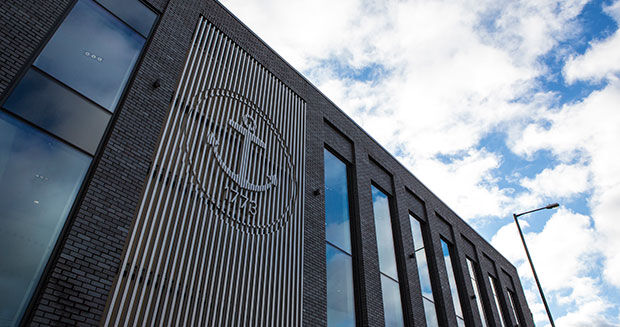
Facilities
Our Gemmology students are based in new, state-of-the-art premises at Moreton Street in the Jewellery Quarter, within the Assay Office Birmingham building.
The purpose-built workshops are spacious and superbly well-equipped with equipment, samples and books. There is access to some of the highest specification of equipment available for gemmological education in the world. Our students also have access to the further advanced equipment housed within the Assay office’s AnchorCert laboratory.
Workshops
Jewellery and Horology workshops are located at the School of Jewellery, complemented with a Technology Hub including state of the art digital manufacturing equipment.
Gemmology
Gemmology is furnished with high specification interactive lecture facilities and is situated within the working environment of Birmingham’s Assay Office.
IT and library
Computers and laptops have the latest Adobe software and you will be given access to Lynda.com as a source of great tutorials and advice to support your studies. The School of Jewellery has its own specialist library with a comprehensive range of international periodicals and access to the Mintel Report.
Exhibitions
Our students love the friendly, welcoming atmosphere of the building and return year on year to our annual exhibitions.
Our staff
Miranda Wells
Associate Professor in Gemmology
With a long and varied career in the jewellery and gems industry, Miranda has experience in the buying and selling of coloured stones and diamonds, manufacturing, retail, and design.
More about MirandaMichelle McCormick
Lecturer
After twenty years of working in the Jewellery and Gemstone industry and studying for numerous trade qualifications, Michelle graduated from the Birmingham City University with a First-class BSc (Hons) in Gemmology and Jewellery studies in 2015.
More about Michelle